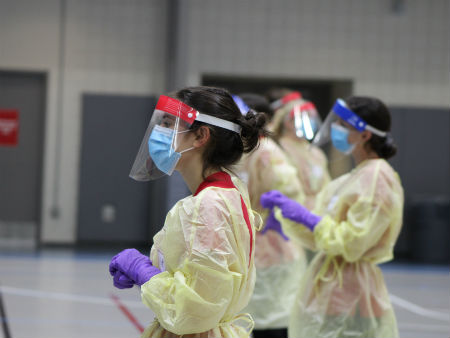As students have transitioned back to campus for the start of the Spring 2021 semester, Fairfield University has continued to implement new and continuously changing COVID-19 policies. The University will now require all students to complete weekly COVID-19 tests, even after the end of the Study in Place period on Feb. 10.
The Fairfield student body’s return to campus for the Spring 2021 semester has been staggered and drawn-out over an elongated timeframe in order to fit into the State of Connecticut’s updated COVID-19 protocols.
Students returning to campus had to complete what the University calls Repopulation Testing. This process consists of administering and mailing a self-implemented COVID-19 test through the clinical laboratory Quest Diagnostics. Then, once returning to campus, complete at least two additional tests.
With the help of Fairfield’s own Marion-Peckham Egan School of Nursing and Health Studies students, this process has been going on non-stop since students trickled back onto University grounds.
“The vast majority of students have been very compliant and have completed their testing as scheduled,” said dean of students, William Johnson. “At this time, we have no reason to believe there will be an outbreak at the end of Study in Place.”
“Thus far, a very low number of students have tested positive since returning to campus,” Johnson stated.
The University’s current Study in Place period consists of tightened social-distancing measurements and more restrictive guidelines. Since the state orders any person traveling from anywhere but New Jersey, New York or Rhode Island to self-quarantine for 10 days, Fairfield’s in-person learning experiences cannot start before Feb. 10. This date continges upon a smooth, manageable completion of Study in Place.
During Study in Place, ample resources have been made available for students including access to the John A. Barone Campus Center for food, mail and other services, as well as some degree of individual study spaces in the Egan School of Nursing, parts of the DiMenna-Nyselius Library and the Charles F. Dolan School of Business.
While Johnson does not expect an outbreak upon the end of Study in Place, he assures us that the University remains prepared for dealing with positive cases amongst the student body.
“We are using the same measure as in the fall,” said Johnson. “Students living in University housing who are unable to safely quarantine or isolate off campus will be provided accommodations in a hotel off campus for quarantine and in the Conference Center on campus for isolation.”
“We have protocols in place to manage increased positivity rates, but we are hopeful that the robust repopulation and surveillance testing will be helpful,” said Julia Duffy, director of the Student Health Center. “It is critical that students carefully follow all the COVID-19 public health measures to decrease the chance of a surge.”
Even if a student has received the COVID-19 vaccine, he or she will still need to participate in weekly testing. This weekly testing, which will continue to occur in the Field House at the Leslie C. Quick, Jr. Recreation Complex, depends upon the compliance of the student body if it is to prove effective.
“Through the month of February, all students residing on or coming to campus will be tested weekly,” said Duffy. “The University COVID-19 Data Management Team is carefully tracking testing participation. The Dean of Students Office will follow up with any student who does not participate in the mandatory testing.”
Johnson’s message for students as the Study in Place period comes to a close remains consistent with his message throughout the entirety of the pandemic.
“We need for students to continue to take the utmost precaution,” said Johnson. Wearing face masks, maintaining social distancing and avoiding large gatherings are all practices that Johnson cited as being particularly important as students begin to move around, both within the confines of campus and in the outside community.


Leave a Reply